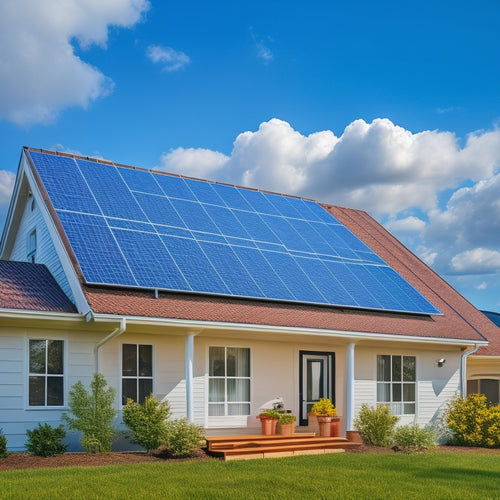
Self Install Solar System
Share
By self-installing a solar system, you'll save money on electricity, reduce your energy costs, and increase your property value. You'll break free from grid reliance, generate your own electricity, and decrease your dependence on utility companies. High-efficiency inverter technology maximizes energy harvesting from your solar panels, and evaluating your energy demands helps you optimize system performance. Plus, going solar considerably lowers your carbon footprint. As you take the reins on your energy consumption, you'll uncover more opportunities to streamline your energy usage and reap the financial benefits - now, let's investigate the specifics of your solar setup.
The Essentials
- Self-installed solar systems provide an affordable DIY option for residential power, reducing energy costs and offering long-term savings.
- DIY installation eliminates labor fees, further reducing expenses and increasing overall savings on electricity bills.
- Government incentives help offset installation costs, making self-installed solar systems a more accessible option for homeowners.
- Solar systems integrate with battery banks, allowing for energy storage and reliability, and reducing dependence on utility companies.
- Self-installation of solar systems can increase property value by up to 17%, making it a valuable investment for homeowners.
Save Money on Electricity
You can greatly lower your electricity bills by utilizing free energy from the sun.
With a well-designed home solar kit, you can overcome common issues such as high upfront costs and limited energy storage capabilities, and enjoy affordable DIY residential solar power.
By installing a solar system, you'll reduce your energy costs and enjoy considerable savings over time.
With a self-installed solar system, you'll be able to generate clean energy and minimize your reliance on the grid.
Lower Your Bills
How much of your hard-earned money is being drained by electricity bills every month? You're not alone. Electricity costs can be a considerable burden, but you have the power to take control.
By installing a solar system, you can greatly lower your bills and start saving money. With the ability to break free from reliance on the grid, you can reap substantial cost savings while taking control of your energy needs.
Additionally, solar power systems provide backup power during outages and emergencies, offering peace of mind and safeguarding against lost productivity and spoiled food.
One of the most notable advantages of going solar is the solar incentives offered by the government. These incentives can help offset the initial cost of installation, making it more accessible to homeowners like you.
With a DIY installation, you can save even more by avoiding labor costs. By utilizing the power of the sun, you can generate your own electricity and reduce your reliance on the grid.
Reduce Energy Costs
Electricity meters ticking away, racking up charges, and draining your wallet - it's a familiar scenario for many homeowners. By installing a solar system, you'll greatly reduce your energy costs, saving you money on electricity bills.
With solar power, you'll generate your own energy, reducing your reliance on the grid and lowering your utility bills. By integrating a Renewable Energy System and a battery bank, you'll have a reliable source of power, even during outages and emergencies. This setup will also enable you to store excess energy generated during the day for use at night or on cloudy days.
As you shift to a self-install solar system, you'll experience a marked decrease in your energy expenditures. This reduction in energy costs won't only benefit your wallet but also contribute to a more sustainable living environment.
By utilizing renewable energy, you'll reduce your carbon footprint and move closer to energy independence. With solar power, you'll have more control over your energy consumption, allowing you to make conscious choices about your energy usage.
Increases Property Value Fast
You'll see a significant impact on your property's value when you self-install a solar system, as it not only generates renewable energy but also contributes to an eco-friendly home renewable energy systems.
This eco-friendly aspect is highly desirable, especially among environmentally conscious homebuyers. It enhances the selling price by making your home more attractive to potential buyers, and it adds lasting value that won't depreciate over time.
In fact, a solar system can increase your property's value by up to 17%, according to the National Renewable Energy Laboratory.
Boosts Selling Price
By investing in a self-install solar system, homeowners can markedly enhance their property's selling price, which is a critical consideration for those planning to sell their homes in the near future.
As you consider installing a solar system, you'll want to keep in mind that it can greatly impact your property's value. According to market trends, homes with solar panels typically sell for more than those without. In fact, a property appraisal will often reflect the added value of a solar system, making your home more attractive to potential buyers.
You can expect a considerable increase in selling price, thanks to the increased energy efficiency and reduced energy costs that come with solar power.
In today's eco-conscious market, buyers are willing to pay a premium for homes that offer sustainable living solutions. By installing a self-install solar system, you're not only reducing your carbon footprint but also increasing your property's appeal to environmentally conscious buyers.
This can result in a faster sale and a higher selling price, giving you the freedom to move forward with your plans.
Adds Lasting Value
Installing a self-install solar system not only enhances your property's selling price but also adds lasting value to your home. By investing in a solar system, you're making a smart decision that will benefit you in the long run. The investment benefits of a self-install solar system are undeniable, and it's crucial to understand how it impacts your property's appeal.
| Benefits | Description |
|---|---|
| Increased Property Value | A self-install solar system increases your property's value, making it more attractive to potential buyers. |
| Energy Savings | With a solar system, you'll save money on your energy bills, which is a significant selling point for environmentally conscious buyers. |
| Enhanced Curb Appeal | Solar panels add a modern touch to your home's exterior, making it more visually appealing. |
| Government Incentives | You may be eligible for government incentives and tax credits, which can offset the initial investment costs. |
High-Efficiency Inverter Technology
You'll want to take into account advanced power conversion capabilities when selecting an inverter for your self-install solar system, as they enable more efficient energy transmission and minimize losses.
For instance, high-efficiency inverters are essential for renewable energy systems that require peak performance. This technology allows you to maximize energy harvesting by optimizing the DC-AC conversion process, ensuring you get the most out of your solar panels.
Advanced Power Conversion
Advanced Power Conversion (High-Efficiency Inverter Technology)
When you decide to self-install a solar system, you'll need to understand advanced power conversion technology. This technology is essential in maximizing energy output from your solar panel technology. High-efficiency inverter technology converts DC power from your solar panels into AC power, which is usable in your home or business.
This process involves sophisticated algorithms and advanced components to minimize energy loss. You'll want to verify your inverter technology is compatible with your energy storage solutions. This integration enables you to store excess energy generated during the day for use during the night or on cloudy days.
Advanced power conversion technology plays a vital role in optimizing energy harvesting and reducing reliance on the grid. By choosing a high-efficiency inverter, you'll reduce energy waste, increase your system's overall efficiency, and enjoy a more reliable and sustainable energy supply.
Maximum Energy Harvesting
High-efficiency inverter technology plays a critical role in maximizing energy harvesting from your solar panel system. You'll want to guarantee you're getting the most out of your investment, and that's where high-efficiency inverters come in.
These advanced systems convert the DC power generated by your solar panels into AC power, which is then fed into your home or grid.
With high-efficiency inverters, you can expect increased solar panel efficiency, resulting in more energy harvested from the same amount of sunlight. This means you'll generate more power and reduce your reliance on the grid.
Energy monitoring systems integrated into these inverters provide real-time data on your energy production, allowing you to optimize your system's performance and identify areas for improvement.
When selecting an inverter, look for high-efficiency models with a high peak efficiency rating. This guarantees that your system is capable of producing maximum power output.
Additionally, consider inverters with built-in energy monitoring systems to track your energy production and optimize your system's performance. By doing so, you'll be able to maximize your energy harvesting and enjoy the freedom that comes with generating your own clean energy.
Assess Your Energy Demands
You need to understand your daily energy usage patterns to determine the size of the solar system required for your home. This involves identifying the times of day when your energy consumption is highest and lowest.
By installing residential solar panels with battery storage, you can reduce your reliance on the grid and guarantee a steady supply of energy.
Additionally, analyzing your energy consumption breakdown can help you pinpoint which appliances and systems are using the most energy, such as electric vehicle charging stations.
Daily Energy Usage Patterns
How much energy do you consume on a daily basis? Understanding your daily energy usage patterns is vital in determining your energy demands. Your energy habits and usage trends play a significant role in evaluating your energy requirements.
Start by monitoring your energy consumption over a period of time to identify patterns and trends. Take note of your energy-intensive activities, such as cooking, laundry, and entertainment.
Identify the times of the day when your energy usage peaks and troughs. Are you an early riser who consumes more energy in the morning, or do you stay up late, using energy-intensive devices?
Analyzing your daily energy usage patterns helps you identify opportunities to optimize your energy consumption. By understanding when and how you use energy, you can make informed decisions about your solar system installation.
This knowledge enables you to design a system that meets your unique energy demands, providing you with the freedom and independence you desire.
Energy Consumption Breakdown
Energy consumption breakdown provides a detailed snapshot of your energy demands, enabling you to pinpoint areas of high energy usage and optimize your solar system installation accordingly. By understanding your energy consumption habits, you can identify opportunities to improve energy efficiency and reduce your reliance on the grid.
To get started, categorize your energy usage into the following segments:
| Appliance | Daily Energy Usage (Wh) | Monthly Energy Usage (kWh) |
|---|---|---|
| Refrigerator | 1200 | 36 |
| Lighting | 600 | 18 |
| TV | 300 | 9 |
| Computer | 200 | 6 |
| Water Heater | 1500 | 45 |
Lower Carbon Footprint Guaranteed
By installing a solar system, you'll considerably reduce your energy consumption today, which directly translates to a lower carbon footprint.
This reduction is guaranteed, as you'll be generating clean energy from the sun, rather than relying on fossil fuels.
With a self-install solar system, you'll be taking a considerable step towards minimizing your impact on the environment.
Reduce Energy Consumption Today
Take control of your energy usage by conducting a thorough audit of your home's appliances, lighting, and HVAC system. This will help you identify areas where you can reduce energy consumption and lower your carbon footprint. Start by replacing traditional incandescent bulbs with energy-efficient LED bulbs and installing smart home technology to optimize your energy usage.
| Energy Conservation Tips | Sustainable Living Practices | Renewable Energy Sources |
|---|---|---|
| Unplug appliances when not in use | Use eco-friendly cleaning products | Invest in solar panels |
| Upgrade to energy-efficient appliances | Implement recycling programs | investigate wind turbines |
| Adjust thermostat settings | Conserve water | Invest in geothermal energy |
| Use power strips to reduce standby power | Reduce food waste | Install solar water heaters |
| Conduct regular energy audits | Implement sustainable transportation | investigate biomass energy |
Frequently Asked Questions
Can I Install Solar Panels on My Roof With Existing Skylights?
You'll need to assess your roof's suitability for solar panels, considering skylight placements, sizes, and obstructions to guarantee a safe and efficient installation that doesn't compromise your skylights' functionality or the structural integrity of your roof.
Do Solar Panels Work During Power Outages?
During power outages, you won't get electricity from your solar panels unless you have a backup power system, like a battery bank, to store excess energy and maintain solar panel efficiency.
Are Self-Install Solar Systems Compatible With Grid-Tie Systems?
When you opt for a grid-tie system, you'll find that many self-installation kits are compatible, offering benefits like reduced installation costs and increased energy independence, but be sure to verify compatibility before making a purchase.
Can I Expand My Solar System in the Future?
You can easily expand your solar system in the future, thanks to its modular design, allowing for seamless future upgrades without worrying about system compatibility, ensuring your investment remains scalable and flexible.
Are There Any Local Building Permits Required for Self-Installation?
Carefully complying with codes, you'll need to steer through intricate local regulations, obtaining necessary permits before commencing your installation process, ensuring a seamless and successful setup that aligns with your area's specific specifications.
Final Thoughts
You've got the power to capture the sun's energy and convert your home into a sustainable oasis. By self-installing a solar system, you're not only slashing your electricity bills, but also increasing your property's value and reducing your carbon footprint. It's like planting a tree that bears fruit instantly - your wallet and the planet will thank you. With high-efficiency inverter technology and a careful assessment of your energy demands, you'll be generating clean energy and reaping the benefits in no time.
Related Posts
-

Top Portable Refrigerators for Camping Adventures
When you're camping, having a reliable portable refrigerator can make all the difference for keeping your food fresh ...
-

Cost of Solar Panel Installation
You can expect to pay between $15,000 and $30,000 or more for a typical solar panel installation, depending on the sy...
-

Designing a Green Roof for Maximum Energy Efficiency
Designing a green roof for maximum energy efficiency involves several key strategies. Start by selecting native, drou...


